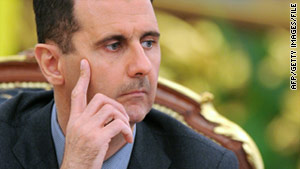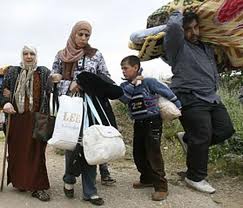 Bashar al-Assad, Syria’s embattled president, is to deliver his third major speech since protests demanding greater freedoms and democracy erupted in Syria in mid-March.
Bashar al-Assad, Syria’s embattled president, is to deliver his third major speech since protests demanding greater freedoms and democracy erupted in Syria in mid-March.
“President Bashar al-Assad will deliver a speech at noon tomorrow concerning developments in Syria,” the official SANA news agency said in a terse dispatch on Sunday, without elaborating.
Assad first addressed parliament on March 30, two weeks after the start of the anti-regime demonstrations, calling the deadly unrest a “conspiracy” fomented by the country’s enemies.
In a televised address on April 16, he announced that the emergency law in force in Syria for nearly 50 years would be abolished, expressed his sadness at the deaths of protesters and called for a national dialogue.
Opposition activists announced on Sunday that they were setting up a “National Council” to spearhead the struggle against his regime.
Syrian opposition activists have created a “National Council” to lead the battle to oust Assad’s regime, their spokesperson Jamil Saib said on Sunday.
“We announce the creation of a National Council to lead the Syrian revolution, comprising all communities and representatives of national political forces inside and outside Syria,” reporters near the Turkish-Syrian border were told.
The activists urged opposition forces “to co-operate in all cities and provinces of Syria to achieve the legitimate goal of overthrowing the regime and bringing it to justice”.
“The purpose of this council is to bring together opposition forces to support the revolution” and ensure that they are heard by the international community, Saib told the AFP news agency.
Refugee exodus
 Meanwhile, Syrian forces swept through a northwestern border region to stem an exodus of refugees to Turkey that is raising international pressure on Assad, witnesses and a rights activist said on Sunday.
Meanwhile, Syrian forces swept through a northwestern border region to stem an exodus of refugees to Turkey that is raising international pressure on Assad, witnesses and a rights activist said on Sunday.
Syrian human rights campaigner Ammar al-Qurabi accused pro-government forces of attacking people who were helping refugees try to escape from a widening military campaign to crush protests against Assad’s rule.
“The Syrian army has spread around the border area to prevent frightened residents from fleeing across the border to Turkey,” Qurabi told the Reuters news agency.
“Militiamen close to the regime are attacking people in Bdama and the surrounding areas who are trying to deliver relief and food to thousands of refugees stuck along the border and trying to flee,” said Qurabi.
Qurabi’s comments could not be independently confirmed, but a local resident backed up his account.
Roads obstructed
According to witness reports, one man driving a tractor 1.5km from the Turkish border was shot in the leg by a sniper and was taken by ambulance to a Turkish hospital on Sunday, Al Jazeera’s Anita McNaught said from southern Turkey.
All the main roads running between Syria and the Turkish border are obstructed by Syrian checkpoints and guard points, and are under surveillance, Hala, a Syrian woman who fled to Turkey, told our correspondent.
Syrians fleeing the violence have had to take back routes through farm lands. They are guided by young men who assist women, children and the elderly, the bulk of the people who are refugees in Turkey currently, to reach Turkey safely, McNaught said.
But people trying to assist had come under attack around the small town of Bdama near the Turkish border, which Syrian troops and gunmen loyal to Assad stormed on Saturday, burning houses and arresting dozens, witnesses said.
For the first time Turkey has begun extending aid across the border to people in the north of Syria, Turkey’s emergency situations agency said in a statement on Sunday.
‘Desperate to tell their stories’
In Turkey, the government is preventing journalists from entering the refugee camps and speaking to Syrians on the grounds of their own security and safety, our correspondent explained.
“Our experience when we have met them has been completely the opposite. We care deeply about their [the refugees] security and safety and we would never reveal the identity of anyone who didn’t want their identity revealed…
“Our experience from meeting them is that they are desperate to tell their stories. They want their message to get out, they want the world to understand what is going on in Syria,” McNaught said.
The Turkish government says more than 10,500 people have crossed over its border and more are camping on the Syrian side.
The head of the International Committee of the Red Cross is due in Damascus on Sunday evening to discuss expanding its relief effort with Syrian officials.

Leave a Reply
You must be logged in to post a comment.